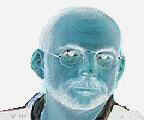|
Interview
with
Donald Antrim
   
Donald
Antrim's most recent novel, The Verificationist, is yet another
step upon the bold literary path that Mr. Antrim is making for
himself. Satire, invention, intelligence, heart: these are the
elements that Antrim utilizes to stand apart from the norm in American
fiction. It is a strange myth and one strangely familiar that he has
weaved since his debut, Elect Mr. Robinson For A Better World.
Neighborhood, home, and even the local pancake house are twisted and
inverted and presented inside-out, giving us a fresh vision of what
is daily overlooked. Mr. Antrim was kind enough to grant failbetter
the following interview, which sheds some light on his dark and humorous
world.
failbetter.com:
At a reading for your most recent book, The Verificationist, you
were asked several questions which seemed more like statements, personal
interpretations of your work. In the same vein, the few interviews that
you have done are filled with more literary explanations and
interpretations by the interviewer, rather than by yourself. How do you
explain this? Do you find such interpretations flattering? Or do you ever
find yourself openly asking: Really, is that what I meant?
Donald
Antrim: Questions about interpretations are never easy to
answer. Often, when I am asked about one or another of the books—in
an interview or even in casual conversation—I have the sense that I am
being asked to address or, possibly, support some vision of the
work. Occasionally this vision, or interpretation, is a surprising
one. There's not much I can do except nod my head. If I
understand your question, though, you're asking about something other than
the nature of interpretations. Is there something about these books,
something which encourages people to wonder about the author's
intentions? This must be so. To some extent, the novels
function as fantasies. They're not complete fantasies; and they may
not, in the end, be truly fantastical at all. But they are dystopic—they're
like little, localized, psychological dytopias, in which bad things happen
in funny ways that are mainly governed by rules inherent in the books
themselves, rather than by the rules that might apply in our more
normative-seeming, day-to-day lives. Might this open the books up to
questions about their meaning, or about my likely intentions? My
real intention is for them to be deeply enjoyable to read. Perhaps
part of the enjoyment, for anyone inclined to have fun with these books,
is found in the state of mind in which the meanings of things remain
ambiguous.
failbetter.com:
With regard to your latest novel, would you care to elaborate on the therapeutic
value of the pancake? More specifically, what were the origins
of your inspiration?
Donald
Antrim: One day when I was about halfway through the previous
novel, The Hundred Brothers, the first sentence of The
Verificationist—"The pancake suppers were my idea"—came
to me, and I wrote it down and filed it away. A year or so went
by. I'd wanted to write something using psychoanalytic material, and
when, after finishing The Hundred Brothers, I came back to that
first sentence, I either decided or simply realized—or maybe I had
decided this sometime earlier—that these were the words of a clinical
psychotherapist. More than that I did not, I think, know. As
to the therapeutic value of the pancake, this topic is explored at
ridiculous length in the novel.
failbetter.com:
In all three of your books, there is a similar sense of structure and
story setting. When it comes to structure, for example, your novels do not
have any chapters or section breaks. Your settings—a neighborhood, a
household, a pancake house—are both very American and ideal for
character interaction. Are these similarities solely stylistic, or do they
imply a vision you have for the body of your work?
Donald
Antrim: When I began Elect Mr. Robinson for a Better
World, I set out a few basic rules for myself. One was that there
would be no chapter breaks. This meant, for me, that all narrative
action would have to grow directly out of itself; even a shift in time or
place would occur as a function of the narrator's continuous, unbroken
report. This rule, I felt, was really a rule about a certain kind of
logic, or about the growth of a logic that is produced through the
narrator's voice, his psychology, and which comes to determine the kind of
things that can and cannot happen as the story proceeds, as events pile up
and the relationship between the characters acquire their own
histories. And the lack of chapters forces a kind of compression;
and, given the compression, I felt that there might be an ideal length for
the books—short. As for the settings, it is true that they
function as gathering places for large numbers of characters.
Everything in these books—the odd or improbable settings, the large,
social groupings, and so on—is done for my pleasure and mental health,
and for the pleasure and mental health of the reader. To me, these
books are like card houses. They hold themselves together.
Their locales are useful and enjoyable to me, and while the books' various
ingredients certainly have meaning for me—atavistic, private meaning—these
elements are not necessarily chosen for their satiric or extraliterary
value, or because they argue for some larger vision for future work.
I
don't have anything mapped out.
failbetter.com:
Your recent essay on influences in The New Yorker is a departure
from the dark humor of your fiction to the dark realities of your growing up—specifically
the relationship between you and your family. Can you tell us—if at all—how
your childhood and family affected the writing of your novels?
Donald
Antrim: Aspects of my childhood are incompletely described in
the three published novels. This description of childhood remains
hidden in metaphor. I imagine that, as time goes on, this is how things
will remain—mostly. The piece for The New Yorker was an
experiment. I wanted to find out how it might feel to do something
like this. I imagine I'll write more along these lines. Maybe,
because of the lack of metaphor, the piece seems naked and direct in a way
that the novels do not. However, I suspect the novels may have more
to offer, as complete works, than anything along the lines of
memoir. The memoir creates the impression of immediate
identification between author and reader, particularly if it—the memoir—declares
itself to be a confession of, or a testament to, something felt by the
reader to be, on the one hand, universally experienced, and, on the other,
intensely private and subjective. But I wonder what our empathic
identifications with autobiographers say about our relationships with
books. Do we read to encounter ourselves? Am I a reliable
reporter on my own life? I don't know that I am. As to how
my family affected my writing—that's what I'm writing to find out.
failbetter.com:
Even for an acclaimed author who has been grouped among the "Top 20
Writers of the 21st Century," your work has, on rare
occasions, been criticized by reviewers. Do you read such reviews? If not,
does feedback even matter once your work goes public? Do you receive feedback
during the writing process itself?
Donald
Antrim: I get a little feedback while I'm writing, especially
during the early stages in a project. The Marines have a few good
men, I have a few good readers. I seem to need a lot of reassurance
that this or that idea is not too crazy or unwieldy—then, after a while,
and after a certain point, maybe ten or twenty or thirty pages in, the
story or novel becomes real to me. It is as if the narrative
acquires potential weight and solidity. Reviews are another
matter. I say I don't read them, and for the most part I don't, and
yet I do read a few, here and there. The really bad ones I stay away
from. Unread bad reviews are little more than mild spanks in the
hazing ritual around the publication of the brand new book. The more
you read reviews, the more important they become. Unread, they
remain what they are: book reviews.
failbetter.com:
Do you focus on one project at a time, or do you have future projects
always brewing? Can you give us any forecast of what you have in the
works?
Donald
Antrim: One at a time. I like the feeling I get if I have an
idea for something to do in the future—this makes me feel safe.
When I'm working on something, my whole life seems better.
Unfortunately, I never have very many ideas. In fact, I never have ideas
at all, in the sense that people usually mean when they talk about
ideas. An idea, for me, might be: A book that starts out at a
pancake supper. Or: A book about a lot of brothers. I generally
start somewhere and hope for the best. Recently, I've startled
something new, and I can't say exactly what it is. I'm hoping for
the best
|